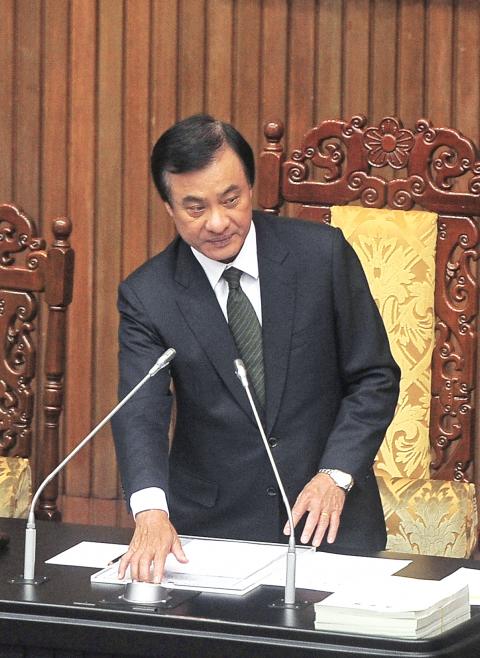Cross-caucus negotiations on the Cabinet’s proposed amendments to the Air Pollution Control Act (空氣汙染防制法) yesterday ended in a stalemate after lawmakers and Environmental Protection Administration (EPA) Minister Lee Ying-yuan (李應元) bickered over two crucial draft amendments that would determine rules on the trading of emission rights and the de facto governing agency for an emission cap on industries in Kaohsiung and Pingtung County.
The Legislative Yuan held a round of cross-caucus negotiations on five proposed amendments to the act, on which lawmakers had yet to reach a consensus.
Article 9 of the draft, which deals with the trading of emission rights between stationary and moving sources of air pollution, proposes that emissions cut from mobile sources — two-stroke scooters and old cars — be added to the quota for stationary emissions, which are mainly from industrial activity.

Photo: Wang Yi-sung, Taipei Times
Chinese Nationalist Party (KMT) lawmakers voiced objections, with KMT Legislator Arthur Chen (陳宜民) saying that Premier William Lai (賴清德) had been misled and underestimates the potential health risks posed by stationary sources of air pollution.
Democratic Progressive Party (DPP) Legislator Wu Kuen-yu (吳焜裕) earlier this month during a question-and-answer session at the legislature with Lai showed him research published in 2000 by the journal Environmental Health Perspectives, which showed no difference in health risks caused by stationary or mobile sources of air pollution, Chen said.
More recent data published by the same journal in 2016, after leaded gasoline was banned, indicates that the likelihood of humans contracting ischemic heart disease from stationary sources of air pollution is five times that of mobile sources, with PM2.5 — airborne particulates measuring less than 2.5 micrometers, being the main culprit, Chen said, adding that the item in question should be removed from the draft amendment.
However, Lee said that the act had already set limits on the types air pollutants factories can generate, and a formula introduced by the EPA sets the ratio for conversion from stationary to mobile sources of emissions at three-to-one.
The item in question would serve as a safeguard that improves the act, rather than undermine it, Lee said.
This drew a rebuke from Chen, who said that Lee was “beating around the bush.”
Lee’s remarks defied scientific evidence and belied his educational background as a Harvard University graduate, Chen said.
Article 12 of the draft, which says that the EPA should act with the Ministry of Economic Affairs when announcing rules it sets on emissions trading and the inspection of air quality control zones, also drew heavy fire from Chen and KMT Legislator Chiang Wan-an (蔣萬安), who criticized the proposal for allowing the ministry to “grab the EPA by the throat” and putting economic development ahead of public health.
The KMT caucus vowed to filibuster the review of the amendments if they were put to a vote without the caucuses reaching a consensus.
DPP caucus whip Ker Chien-ming (柯建銘) said that his caucus would deal with the draft amendments in an extraordinary session expected to be held next month, as the regular session is drawing to a close and the act contains more than 100 articles, meaning it would likely take days to finish a review if the KMT were to filibuster proceedings.

Chinese Nationalist Party (KMT) Chairman Eric Chu (朱立倫), spokeswoman Yang Chih-yu (楊智伃) and Legislator Hsieh Lung-chieh (謝龍介) would be summoned by police for questioning for leading an illegal assembly on Thursday evening last week, Minister of the Interior Liu Shyh-fang (劉世芳) said today. The three KMT officials led an assembly outside the Taipei City Prosecutors’ Office, a restricted area where public assembly is not allowed, protesting the questioning of several KMT staff and searches of KMT headquarters and offices in a recall petition forgery case. Chu, Yang and Hsieh are all suspected of contravening the Assembly and Parade Act (集會遊行法) by holding

PRAISE: Japanese visitor Takashi Kubota said the Taiwanese temple architecture images showcased in the AI Art Gallery were the most impressive displays he saw Taiwan does not have an official pavilion at the World Expo in Osaka, Japan, because of its diplomatic predicament, but the government-backed Tech World pavilion is drawing interest with its unique recreations of works by Taiwanese artists. The pavilion features an artificial intelligence (AI)-based art gallery showcasing works of famous Taiwanese artists from the Japanese colonial period using innovative technologies. Among its main simulated displays are Eastern gouache paintings by Chen Chin (陳進), Lin Yu-shan (林玉山) and Kuo Hsueh-hu (郭雪湖), who were the three young Taiwanese painters selected for the East Asian Painting exhibition in 1927. Gouache is a water-based

Taiwan would welcome the return of Honduras as a diplomatic ally if its next president decides to make such a move, Minister of Foreign Affairs Lin Chia-lung (林佳龍) said yesterday. “Of course, we would welcome Honduras if they want to restore diplomatic ties with Taiwan after their elections,” Lin said at a meeting of the legislature’s Foreign Affairs and National Defense Committee, when asked to comment on statements made by two of the three Honduran presidential candidates during the presidential campaign in the Central American country. Taiwan is paying close attention to the region as a whole in the wake of a

OFF-TARGET: More than 30,000 participants were expected to take part in the Games next month, but only 6,550 foreign and 19,400 Taiwanese athletes have registered Taipei city councilors yesterday blasted the organizers of next month’s World Masters Games over sudden timetable and venue changes, which they said have caused thousands of participants to back out of the international sporting event, among other organizational issues. They also cited visa delays and political interference by China as reasons many foreign athletes are requesting refunds for the event, to be held from May 17 to 30. Jointly organized by the Taipei and New Taipei City governments, the games have been rocked by numerous controversies since preparations began in 2020. Taipei City Councilor Lin Yen-feng (林延鳳) said yesterday that new measures by